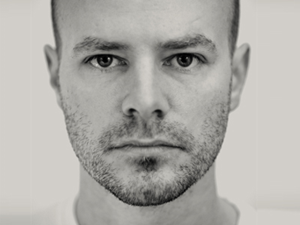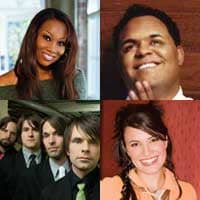
He's the contemporary Christian music artist who breaks all the rules. Derek Webb talks with Beliefnet about the controversy he's stirred and how the Lord's Prayer brought him to his knees.
Q. You are a founding member of CCM band Caedmon’s Call. Then you went solo and started taking on social and political issues. What made you go in a different direction?
A. Honestly, I feel like I’ve always been the same writer. When we started Caedmon’s, I was just out of high school. Even before I was using music to express myself, I’ve always been wired a particular way. As a kid, I’d hear things that sounded like conventional wisdom and cock my head to one side. I’ve always been a little suspicious of structures of authority. I think I spent a lot of my time in Caedmon’s trying to figure out if that was right for me to be that way. I eventually figured out that God made me this way for a reason. My creative life would be better spent figuring out what the right things are to rebel against rather than trying to not be who I was.
Q. You’re one of the only people I know of who has a fake Twitter based off the old version of you.
A. Yes, I don’t know who it is…
Q. Some inspired fan that says, "I miss the way Derek Webb was when he wasn’t controversial." What did you think when that started getting popular?
A. I thought it was fantastic. If people won’t go with me, they can just follow that guy. Then, somebody else popped up as the future me. I guess I’m the present one. When the three of us get into a conversation on Twitter, you kind of feel the space-time-continuum starting to stretch a little. I get it. When they connect to an artist at a certain point in their lives and it means something significant to them, they want that person to stay with them in that moment. When that person evolves and moves on, then I get how people could be really resistant and resentful of that. I get the people who just wish I would remake my first record every time and really want me to apply myself only to the state of the American Church and talking about those issues. I really do understand that. I’m so glad they connected at all. It’s an honor that people would have spent even a year of their lives connected to what I was making then. Beyond that, maybe they need to be okay with the idea that they’re just not really a fan of mine anymore. I’m not going back. It’s just not in my DNA. There’s so much great music out there, there’s bound to be something else for them now. It doesn’t have to be me, and I’m okay with that.
Q. Your album Feedback -- which is an instrumental interpretation of the Lord's Prayer -- is something that I’m not sure people were expecting. Speaking of the word feedback, were you concerned about the response? When people think of worship, they might not be thinking about what you have here.
A. Not at all did I consider anyone’s reaction. The reason is that I, in the last four or five years, have had a real shift in my creative framework. It puts me in a place where that’s not even a consideration for me. It used to be about the product. Now, the entire thing to me now is the process. I’m going to spend the next six months of my life making this. Who do I want to make it with? What do I want to learn in order to be able to make it? What new tools do I want to learn to enable me to make it? When it came to Feedback, this ethic was fully in place when it came time to make this album. I thought, I don’t know anything about instrumental music; that will be a real challenge and that sounds fun. I don’t know a lot about the Lord’s Prayer, so I’d love to dive into that. By the time it was done, the decisions were made that led to the album. So, ‘What is the product going to look like?’ Well, who cares? Who knows? ‘Do you think anyone’s going to buy it or want to listen to it?’ I don’t know. I don’t want to spend my life thinking about things like that. I want to spend my life really loving and enjoying the process.
Q. What did you learn from the process?
A. There are only nine lines in the prayer. We thought we’ll compose a song for each line. That’s nine songs that seem like a pretty consumable piece of music. I don’t want to overwhelm people with some epic. The Lord’s Prayer has three major sections, so the way we wanted to write it, it really worked to compose it in the three movements. I really don’t know that much about the Lord’s Prayer, so I literally spent six months researching and studying before I recorded a note of music. Honestly, the best part about it was how the prayer itself really enabled the creative process.
I remember the first week I spent working on the record. I had it up on my whiteboard. Here are the nine songs, and here’s how I’m going to divide it up: 'Hallowed be Thy name' or 'Our Father in Heaven'. There is so much communicated in that line. Every word of it is significant. 'Our Father' means it’s not an individual, private personal thing. It’s corporate. He’s not my father. He’s not your father. He’s our father. Father is an intimate term. He’s not like a deity. He is a deity, but He’s being addressed intimately here. He’s my father. He’s close, but He’s in Heaven. He’s different. He’s other. He’s intimate, yet He’s transcendent. You put all the words together and there’s even more. How in the world do you communicate that in nothing but rhythm and melodic elements and no words?
I would meditate, stare at my speakers and try to figure out what should be coming out. The thing that eventually pulled me through was the prayer itself. It was coming into the studio and saying, "I don’t know what I should be doing. I need God to provide for me the tools just to be able to get through this day." The process of getting in over my head, which I consider real spiritual discipline, really threw me onto the prayer itself. "I need only what I need for right now. If it shows up, I’ll be grateful, and if not then, Your will be done." It’s incredible how the whole thing was a worship experience for me personally, because of the fact that the record got made at all. Going to God with a daily, hourly dependence, altering the context of His will being done and not mine and receiving whatever He gives. This record is what He gave me.


